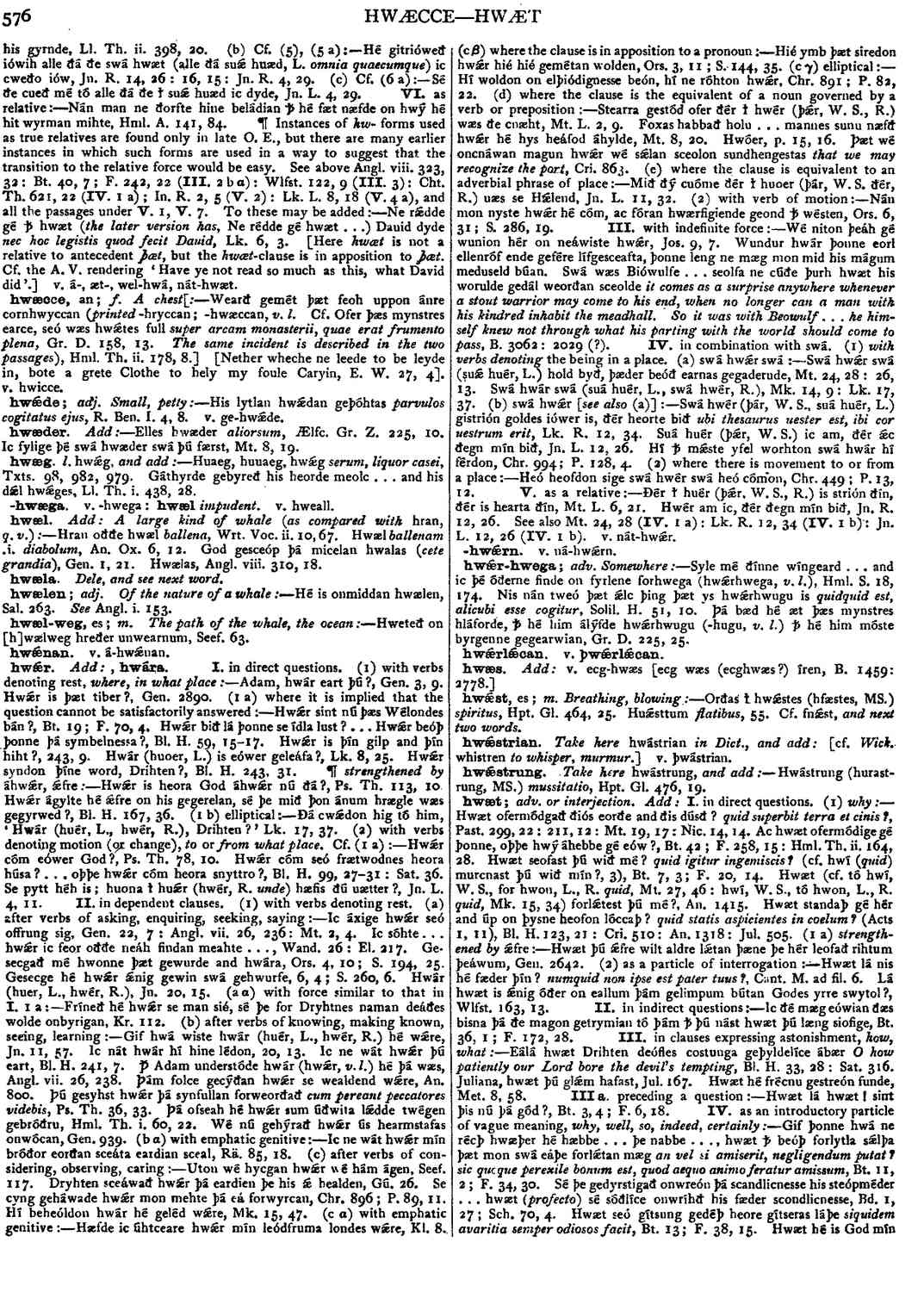hwǽr
-
Adam, hwár eart þú?,
- Gen. 3, 9.
-
Hwǽr is þæt tiber?,
- Gen. 2890. (1 a)
-
Hwǽr is þín gilp and þín hiht?,
- 243, 9.
-
Hwár (huoer,
- L.) is eówer geleáfa?, Lk. 8, 25.
-
Hwǽr syndon þíne word, Drihten?, Bl. H. 243, 31. ¶
strengthened by
áhwǽr, ǽfre :-- Hwǽr is heora God áhwǽr nú ðá?,- Ps. Th. 113, 10.
-
Hwǽr ágylte hé ǽfre on his gegerelan, sé þe mið þon ánum hrægle wæs gegyrwed?,
- Bl. H. 167, 36. (1 b) elliptical :-- Ðá cwǽdon hig tó him, 'Hwár (huér, L., hwér, R.), Drihten?' Lk. 17, 37.
-
Hwǽr cóm eówer God?,
- Ps. Th. 78, 10.
-
Hwǽr cóm seó frætwodnes heora húsa? ... oþþe hwǽr cóm heora snyttro?,
- Bl. H. 99, 27-31: Sat. 36.
-
Se pytt héh is; huona ł huǽr (hwér, R.
unde
) hæfis ðú uætter?,- Jn. L. 4, 11.
-
Ic áxige hwǽr seó offrung sig,
- Gen. 22, 7: Angl. vii. 26, 236: Mt. 2, 4.
-
Ic sóhte ... hwǽr ic feor oððe neáh findan meahte ...,
- Wand. 26: El. 217.
-
Gesecgað mé hwonne þæt gewurde and hwára,
- Ors. 4, 10; S. 194, 25.
-
Gesecge hé hwǽr ǽnig gewin swá gehwurfe,
- 6, 4; S. 260, 6.
-
Hwár (huer,
- L., hwér, R.), Jn. 20, 15. (a α)
-
Fríneð hé hwǽr se man sié, sé þe for Dryhtnes naman deáðes wolde onbyrigan,
- Kr. 112.
-
Gif hwá wiste hwár (huér,
- L., hwér, R.) hé wǽre, Jn. 11, 57.
-
Ic nát hwár hí hine lédon,
- 20, 13.
-
Ic ne wát hwǽr þú eart,
- Bl. H. 241, 7.
-
Ꝥ Adam understóde hwár (hwǽr,
v. l.
) hé þá wæs,- Angl. vii. 26, 238.
-
Þám folce gecýðan hwǽr se wealdend wǽre,
- An. 800.
-
Þú gesyhst hwǽr þá synfullan forweorðað
cum pereant peccatores videbis,
- Ps. Th. 36, 33.
-
Þá ofseah hé hwǽr sum úðwita lǽdde twégen gebróðru,
- Hml. Th. i. 60, 22.
-
Wé nú gehýrað hwǽr ús hearmstafas onwócan,
- Gen. 939.
- (b α) with emphatic genitive :-- Ic ne wát hwǽr mín bróðor eorðan sceáta eardian sceal, Rä. 85, 18.
-
Uton wé hycgan hwǽr wé hám ágen,
- Seef. 117.
-
Dryhten sceáwað hwǽr þá eardien þe his ǽ healden,
- Gú. 26.
-
Se cyng geháwade hwǽr mon mehte þá eá forwyrcan,
- Chr. 896; P. 89, 11.
-
Hí beheóldon hwár hé geléd wǽre,
- Mk. 15, 47.
- (c α) with emphatic genitive :-- Hæfde ic úhtceare hwǽr mín leódfruma londes wǽre, Kl. 8. (c β) where the clause is in apposition to a pronoun :-- Hié ymb þæt siredon hwǽr hié hié gemétan wolden, Ors. 3, 11; S. 144, 35. (c γ) elliptical :-- Hí woldon on elþiódignesse beón, hí ne róhton hwǽr, Chr. 891; P. 82, 22.
-
Stearra gestód ofer ðér ł hwér (þǽr,
- W. S., R.)
-
Foxas habbað holu ... mannes sunu næfð hwǽr hé hys heáfod áhylde,
- Mt. 8, 20.
-
Hwóer, p. 15, 16, Þaet wé oncnáwan magun hwǽr wé sǽlan sceolon sundhengestas
that we may recognize the port,
- Cri. 863.
-
Mið ðý cuóme ðér ł huoer (þár,
- W. S. ðér, R.)
-
Nán mon nyste hwǽr hé cóm, ac fóran hwærfigiende geond ꝥ wésten,
- Ors. 6, 31; S. 286, 19.
-
Wé niton þeáh gé wunion hér on neáwiste hwǽr,
- Jos. 9, 7.
-
Wundur hwár þonne eorl ellenróf ende gefére lífgesceafta, þonne leng ne mæg mon mid his mágum meduseld búan. Swá wæs Biówulfe ... seolfa ne cúðe þurh hwæt his worulde gedál weorðan sceolde
it comes as a surprise anywhere whenever a stout warrior may come to his end, when no longer can a man with his kindred inhabit the meadhall. So it was with Beowulf ... he himself knew not through what his parting with the world should come to pass,
B. 3062: 2029 (?).
-
Swá hwǽr swá (suǽ huér,
- L.)
-
Swá hwár swá (suá huér,
- L., swá hwér, R.), Mk. 14, 9: Lk. 17, 37.
-
Swá hwér (þár, W. S., suá huér, L.) gistrión goldes iówer is, ðér heorte bid
ubi thesaurus uester est, ibi cor uestrum erit,
- Lk. R. 12, 34.
-
Suá huér (þǽr,
- W. S.) ic
-
Hí ꝥ mǽste yfel worhton swá hwár hí férdon,
- Chr. 994; P. 128, 4.
-
Heó heofdon sige swá hwér swá heó cómon,
- Chr. 449; P. 13, 12.
-
Ðér ł huér (þǽr,
- W. S., R.) is
-
Hwér am ic, ðér ðegn mín bið,
- Jn. R. 12, 26.
- See also Mt. 24, 28 (
Bosworth, Joseph. “hwǽr.” In An Anglo-Saxon Dictionary Online, edited by Thomas Northcote Toller, Christ Sean, and Ondřej Tichy. Prague: Faculty of Arts, Charles University, 2014. https://bosworthtoller.com/53456.
Checked: 0